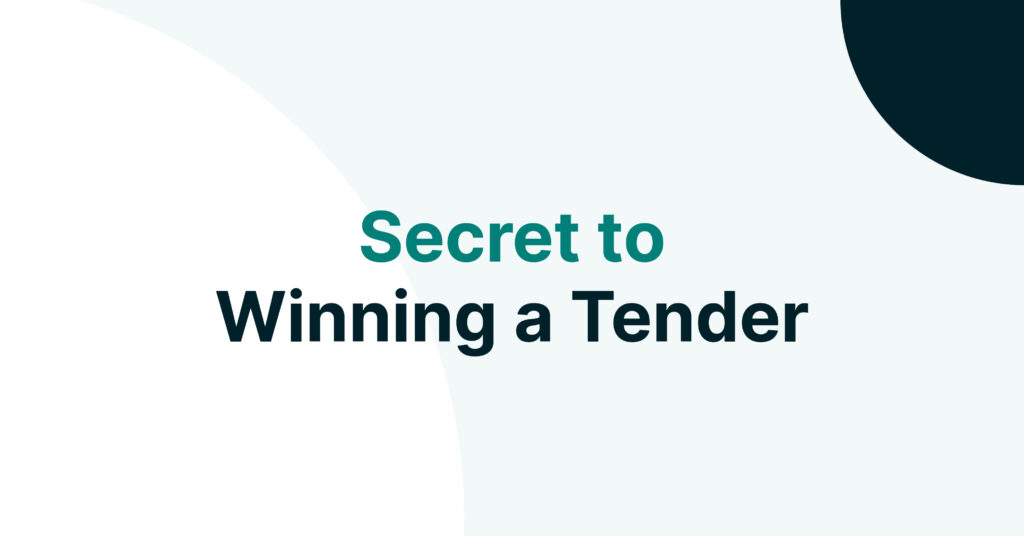How to Complete a Tender and Win Your Next Contract
Find out how to complete a tender from bid writing experts
Do you want to know how to complete a tender? Tendering for contracts is a great way to find new opportunities for your business. However, successfully completing a tender can be a difficult task. Especially if you’re new to the tendering process.
That’s why we’ve put together this blog. To help you understand how to complete a tender and win your next contract!
What’s involved in the tendering process?
If you want to know how to complete a tender, it’s absolutely crucial that you understand the tendering process. So, let’s go through it, step by step.
Step 1: Find your tender
The first step of the tendering process is actually finding a contract to bid on.
When you first start tendering for work, it can be tempting to bid on as many contracts as possible. Some businesses assume that this will increase their chances of winning work. However, it can actually have the opposite effect and you risk spreading your resources too thin. You could also make the mistake of bidding for work that isn’t actually relevant to your company.
When learning how to complete a tender, it’s important that you choose tenders that your company can win. Otherwise, your time and resources will go to waste.
Here are some things to keep in mind while deciding whether to bid or not to bid:
- Do you meet the financial standing?
- Can you offer something unique in the market?
- Does this fit with your long-term strategy?
- Will you need to outsource any work?
- Do you have time?
- Would you choose yourself for this?
There are many different ways to find tendering opportunities. Our sister company, Hudson Discover, houses 11 sector-specific tendering portals:
- Creative Tenders
- Construction Tenders
- Healthcare Tenders
- Facilities Tenders
- Logistics Tenders
- Research Tenders
- Technology Tenders
- Consultancy Tenders
- HR Tenders
- Hospitality Tenders
- Finance Tenders
In each portal, you’ll find all the tendering opportunities relevant to your sector.
Step 2: PQQ/SQ
The next step of learning how to complete a tender is to complete the PQQ or SQ.
PQQ stands for pre-qualification questionnaire. It can also be referred to as an SQ, which stands for selection questionnaire.
Basically, buyers use a PQQ to filter through prospective suppliers. Only suppliers that pass the PQQ are invited to the next stage of the tendering process.
When you complete a PQQ, you’ll be asked to provide the buyer with information about your company such as:
- The status of your organisation
- Details of your finances
- How you manage quality
- Your environmental, social and health and safety policies
- Case studies and testimonials.
However, it’s important to note that only closed tenders rely on PQQs. The buyer might release an open tender, which means that any suppliers can bid for that contract.
Step 3: ITT
Step 3 of the tender process is the ITT. If you want to learn how to complete a tender, understanding the ITT is crucial.
ITT stands for invitation to tender. The buyer will send an ITT document to the suppliers that were successful at the PQQ stage. Basically, the ITT is an invitation to submit a more detailed response to the buyer.
A typical ITT document will include the following information:
- A cover/ITT letter
- The scope of the contract
- Submission terms
- A buyer profile
- The award criteria
- Specification
- Separate appendices.
If you’re bidding for the contract, you need to respond to the ITT.
Suppliers need to complete a series of online questions and provide relevant case studies as part of their tender response. Your tender response is used to evaluate your suitability for the contract. The information required of you will be similar to the PQQ stage – see step 2. However, you’ll need to provide more detail at this stage of the process.
Step 4: The buyer evaluation your response
If you’re searching for ‘how to complete a tender’, you might not know much about the buyer’s evaluation process. However, understanding the buyer’s evaluation process is vital for tendering success.
Buyers are looking for the Most Economically Advantageous Tender (MEAT). This means that the supplier whose services are the best value for the lowest price will win the bid. MEAT was introduced to make the tendering process fairer. The buyer will consider all aspects of their tender submission, not just the price.
The buyer should release the award criteria as part of the ITT, so you’ll be aware of the scoring process.
Typically, your tender response will be awarded a score between 0 and 10. Many buyers will immediately reject any responses that score less than 5/10, streamlining the evaluation process.
Here’s another thing you need to know about the evaluation process when learning how to complete a tender. You need to understand the weighting of each part of the evaluation criteria. The criteria most important to the buyer will carry the highest weight.
Step 5: Awarding the contract
If you’re learning how to complete a tender, you’ll definitely be interested in the next step of the tendering process. Now it’s time for the buyer to award the contract to the winning supplier.
Whether you’re successful or not, the buyer will provide you with a final score and feedback.
What skills do you need to complete a tender?
Now you understand the tendering process, what’s next?
If you’re wondering how to complete a tender, you’ll need to know what skills are necessary for tendering success. After all, not just anyone can write a winning bid.
Here are the skills you need to win your next contract:
• Writing skills
To write a successful tender response, you need to be a talented writer.
You might think it goes without saying. If you want to learn how to complete a tender, obviously you need writing skills.
However, many people underestimate how important this skill is for tendering success. Knowing the ins and outs of your company isn’t enough. You need to know how to persuade the buyer by using the appropriate tone, voice and style in your response.
• Excellent time management
The next skill for learning how to complete a tender is excellent time management.
It’s crucial that you submit your tender response before the buyer’s deadline and not at the last second. If the tender is due at 5pm, don’t try and submit your response at 4:58pm. If the portal crashes, you won’t be able to submit. Not only will you miss that particular opportunity, but your company’s time and resources will have gone to waste.
• Strong attention to detail
When you’re learning how to complete a tender, it’s important that you have a keen eye for detail.
This skill will benefit you at multiple stages of the tendering process. No matter how many pages the buyer’s specifications might be, you need to take in every detail. If you don’t take in every detail, you might miss key aspects of their criteria. And you’ll never win the bid!
You also need to take in every detail of your own response to proofread it before the submission date. Otherwise, you might accidentally submit a response full of spelling mistakes and grammatical errors. The buyer won’t be impressed by that!
Top tips for tendering success…
For those of you learning how to complete a tender, here are our top tips for tendering success:
-
Gather relevant evidence
You need to show the buyer’s how you’ll deliver the contract, not just tell them. To do this, you should gather relevant case studies and testimonials from clients.
-
Thoroughly read the buyer’s questions and specifications
If you want to learn how to complete a tender, then this next tip is key. You should carefully read through the buyer’s specifications, no matter how long it takes.
Many suppliers provide the buyer with information they want the buyer to know and ignore the buyer’s criteria. However, it’s highly likely that, should you do this, you won’t be answering the buyer’s questions. If that’s the case, you’ll be wasting your tender response – and you won’t win the bid!
-
Proofread your response
As we’ve already established, a tender response full of mistakes won’t impress the buyer. So, to improve your chances of success, you need to carefully proofread your response.
It can be difficult to spot mistakes in your own writing, especially when you’re working with large documents. That’s why we suggest asking a second person to proof your work for mistakes and errors.
-
Take the buyer’s feedback onboard
This is one of our top tips for learning how to complete a tender. If you tender for work and are unsuccessful, you need to take the buyer’s feedback onboard.
Losing out on a contract is disappointing, especially when you’ve spent so long producing your tender response. However, you should view every tender (win or lose) as a learning curve. That way, you’ll know how to overcome your mistakes and improve for your next submission.
Want to know how to complete a tender? Visit Tender VLE!
If you have any more questions about writing a winning tender, then Tender VLE will have the answer.
Join the UK’s first ever virtual learning environment to offer a range of free tender-related videos. Whether you have years of tendering experience or are starting out from scratch, Tender VLE will have something for you.
Think there’s something missing? If you can’t find the video you’re looking for, then tell us more about the content you’d like to see!
See something you like? Contact our team for a quick chat and start your Tender VLE journey today.
Do you need help with a tender? Hudson Succeed can help!
If you’re still wondering how to complete a tender, then don’t worry! Hudson Succeed is here to help.
We’re a global provider of bid writing services. We have an 87% success rate and over 60 years of collective bid writing experience. If you want to write a winning bid, then you’ve come to the right place.
We offer services that will help you secure tendering opportunities for your business. Our expert Bid Writing Team can help you with:
Tender Ready
A 4-week programme designed to introduce you to the tendering process. One of our highly skilled Bid Writers will work with you to make sure your business is ready to tender.
Tender Improvement
Have you tendered before but are yet to see the benefits of your efforts? Tender Improvement is designed for you. One of our Bid Writers will review your previous tender responses and work to improve them for further tender submissions.
Tender Writing
Choose Tender Writing if you want the whole package. All we need from you is information about your company – then we’ll do the rest. From writing through to submission, a member of our Bid Writing Team will take care of it all.
Tender Mentor
If you’ve written your tender responses and just want a fresh perspective, then Tender Mentor is the package for you. A member of our team will proofread your tender responses, checking for inconsistencies, grammar or spelling errors. We’ll also check your responses to make sure they meet the contract’s specifications. Just ask a member of our Bid Writing Team!
Get in touch with one of our expert Bid Writers and watch your company grow.
Why not try Discover Elite?
There’s even more on offer with Discover Elite.
Upgrade your tendering experience with Discover Elite and take the next step to success.
Contact our team to find out more!








